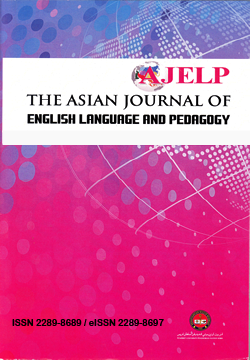The Design and Implementation of a Smartphone App to Teach English Language Components and Its Effect on EFL Learners’ Achievement Motivation
DOI:
https://doi.org/10.37134/ajelp.vol10.2.6.2022Keywords:
achievement, motivation, multimedia/hypermedia systems, language learning Smartphone applicationAbstract
The researchers applied a smartphone e-learning app run on the Android operating systemto teach English vocabulary and grammar and investigated its effectiveness in boosting motivation among English as Foreign Language (EFL) learners. The app was designed via Java programming tools and the Android development environment. To test the app’s effectiveness, sixtyupper-intermediate EFL learners were selected to participate in the study. The participants were then randomly assigned to an experimental and a control group. At first, the participants in the two groups were administered a questionnaire on their achievement motivation. This was followed by twenty sessions of instruction based on the developed app for the experimental group, the traditional teaching practice by a teacher, and the textbook for the control group. After the instruction, the post-test of achievement motivation was administered to both groups. The Mann-Whitney U test showed that integrating the app in EFL classes can significantly affect the mastery and performance types of achievement motivation among language learners.
Downloads
References
Ager, R. (2013). Information and communications technology in primary schools: children or computers in control? Routledge.
Ames, C. (1992). Classrooms: Goals, structure, and student motivation. Journal of Educational Psychology, 84, 261-271.
Bates, A. T. (2005). Technology, e-learning and distance education. Routledge.
Beniger, J. (2009). The control revolution: Technological and economic origins of the information society. Harvard university press.
Boling, E., & Lee, S. H. (1999). Screen Design Guideline for Motivation in Interactive Multimedia Instruction: A Survey and Framework for Designers. Educational Technology, 39 (3), pp. 19-24.
Campbell, C., & Jane, B. (2012). Motivating children to learn: The role of technology education. International Journal of Technology and Design Education, 22(1), 1-11.
Chiu, Y. H. (2013). Computer‐assisted second language vocabulary instruction: A meta‐analysis. British Journal of Educational Technology, 44(2), E52-E56.
Dornyei, Z. (2001). Teaching and Researching Motivation. England: Pearson Education Limited.
Dweck, C. S., & Leggett, E. L. (1988). A social-cognitive approach to motivation and personality. Psychological Review, 95, 256 – 273.
Elliot, A. J. & McGregor, H. (1999). Text anxiety and the hierarchical model of approach and avoidance achievement motivation. Journal of Personality and Social Psychology, 76, 628-644.
Fogg, B. J. (2002). Persuasive technology: using computers to change what we think and do. Ubiquity, 2002(December), 5.
Gardner, R.C., & Lambert, W.E. (1972). Attitudes and motivation: Second language learning. Newbury House.
Godwin-Jones, R. (2008). Emerging technologies, Mobile-computing trends: Lighter, Faster, & Smarter. Language Learning and Technology, 12(3), 3-9.
Godwin-Jones, R. (2017). Smartphones and language learning. Language Learning & Technology, 21(2), 3–17.
Guthrie, J. T., & Davis, M. H. (2003). Motivating struggling readers in middle school through an engagement model of classroom practice. Reading & writing quarterly, 19(1), 59-85.
Hsu, L. (2013): English as a foreign language learners’ perception of mobile assisted language learning: a cross-national study. Computer Assisted Language Learning, 26(3), 197-213.
Ito, M. (2009). Living and learning with new media: Summary of findings from the digital youth project. MIT Press.
Jung, H.-J. (2014). Ubiquitous learning: Determinants impacting learners' satisfaction and performance with smartphones. Language Learning & Technology, 18(3), 97–119.
Kalyuga, S. (2007). Enhancing instructional efficiency of interactive e-learning environments: A cognitive load perspective. Educational Psychology Review, 19(3), 387-399.
Kebritchi, M. (2007). “The effect of modern math video games on students math achievement and math course motivation”, Doctoral dissertation, University of Florida, http://www.tarfandestan.com/forum/thread25241.html.
Kumaravadivelu, B. (2006). Understanding language teaching. Lawrence Erlbaum Associates: New Jersey.
Li, J., & Cummins, J. (2019). Effect of using texting on vocabulary instruction for English learners. Language Learning & Technology, 23(2), 43–64.
Li, Z. &Hegelheimer, V. (2013). Mobile-assisted grammar exercises: Effects on self-editing in L2 writing. Language Learning & Technology, 17(3), 135–156.
Liu, M., Moore, Z., Graham, L., & Lee, S. (2002). A look at the research on computer-based technology use in second language learning: A review of the literature from 1990–2000. Journal of research on technology in education, 34(3), 250-273.
Nakata, T. (2011). Computer-assisted second language vocabulary learning in a paired-associate paradigm: a critical investigation of flashcard software.Computer Assisted Language Learning, 24(1), 17-38.
Olleveno, A. & Taylor, R. (2000). Teaching Mathematics with ICT, Continuum, London.
Parsons, D. (2014). The future of mobile learning and implications for education and training. Increasing Access, 217.
Samuel, R., & Bakar, Z. (2006). The utilization and integration of ICT tools in promoting English language teaching and learning: Reflections from English option teachers in Kuala Langat District, Malaysia. International Journal of Education and Development using ICT, 2(2), 4-14.
Senko, C. (2016). Achievement goal theory. Handbook of motivation at school, 75.
Shadiev, R. Hwang, W. & Huang, Y. (2017): Review of research on mobile language learning in authentic environments. Computer Assisted Language Learning, DOI: 10.1080/09588221.2017.1308383.
Smith, S. & Wang, S. (2013). Reading and grammar learning through mobile phones. Language Learning & Technology, 17(3), 117–134.
Ushioda, E. (2013). Motivation Matters in Mobile Language Learning: A Brief Commentary. Language Learning & Technology, 17(3), 1–5.
Wolters, C.A. (2004). Advancing achievement goal theory: Using goal structures and goal orientations to predict students' motivation, cognition, and achievement. Journal of Educational Psychology, 96, 236-250.
Downloads
Published
How to Cite
Issue
Section
License
Copyright (c) 2022 Yahya Gordani, Yaser Khajavi

This work is licensed under a Creative Commons Attribution-NonCommercial-ShareAlike 4.0 International License.





